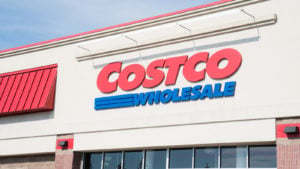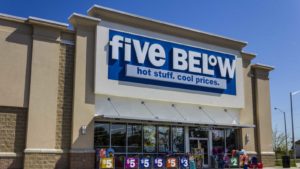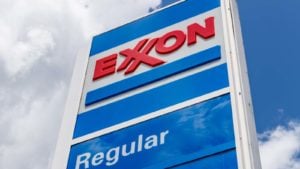While the rest of Wall Street may be basking in the glow of screaming-hot economy, contrarian investors may want to consider the best stocks for a volatile market. Just like in a game of baseball, all it takes is one bad inning to see a big lead evaporate.
Yes, U.S. GDP for the third quarter sizzled against expectations. However, that’s probably not an excuse to lose vigilance. For one thing, inflation and interest rates (which obviously impact borrowing costs) both stand at elevated levels. In turn, consumers have little choice but to cut back on their spending. Given that spending represented the bulk of GDP growth, it’s almost a forgone conclusion that Q4 won’t offer a repeat performance.
Even if it did, that would still mean more dollars chasing after fewer goods, which doesn’t help the inflation problem. Also, amid the consumer cutbacks, companies have responded with layoff announcements. And we’re not talking about burgers-and-fries jobs but legitimate white-collar opportunities.
Stated differently, investors must read between the lines. On that note, here are the best stocks for a volatile market.
Costco (COST)

While no market idea should ever be considered a guarantee for best stocks for a volatile market, Costco (NASDAQ:COST) offers – all other factors being considered – a great candidate. No, you’re probably not going to get rich off COST. As well, it’s not immune from a sharp downcycle, as the Great Recession demonstrated. Nevertheless, it tends to lose air gradually and eventually, it rises higher.
How come? Fundamentally, Costco – as a membership-only warehouse-style retailer – benefits from a higher-income crowd. When you compare the average Costco shopper to that of other big-box retailers, you’ll find that the former category is more upwardly mobile and carries higher spending power. Therefore, when push comes to shove, COST should be one of the least-impacted ideas (on a relative scale).
While COST isn’t cheap, it offers predictable revenue growth and consistent profitability. In addition, it enjoys a cash-rich balance sheet relative to debt. Analysts rate shares a consensus strong buy with a $600.22 average price target.
Exelon (EXC)

Based in Chicago, Illinois, Exelon (NASDAQ:EXC) makes its case for best stocks for a volatile market due to relevance. As the largest electric parent company in the U.S. by revenue, it commands a natural monopoly. Not only is the underlying utility sector heavily regulated (and thus difficult to enter), Exelon natively features a massive moat. Stated differently, its customers must pay up irrespective of economic conditions.
Now, is that a cynical way to approach the best stocks for a volatile market? Absolutely. However, with arguably limited choices, you’ve got to work with what you have. With Exelon, the cynicism is what keeps the business moving forward. Purely by the financials, it doesn’t seem that attractive. However, the one metric that does pop – consistent profitability over the past decade – is what we really need.
And that consistency helps the utility support its 3.54% dividend yield. Overall, analysts peg EXC a moderate buy with a $42.78 target, implying 8% upside.
PepsiCo (PEP)

A multinational food, snack and beverage corporation, PepsiCo (NASDAQ:PEP) offers an appropriate idea for multiple scenarios. However, I believe it will especially become prominent as one of the best stocks for a volatile market. To be sure, the Great Recession proved that even relevant ideas can suffer badly during a downturn. However, PepsiCo is one of the enterprises that consistently marches higher.
How come? Primarily, PepsiCo is well-positioned at the moment thanks to the trade-down effect. During decisively bullish cycles – such as before the 2008 financial crisis – consumers are more carefree with their expenditures. Under pressure, though, that collective wallet tightens up. However, people still need the occasional palate-pleasing treat.
With PepsiCo being one of the crown jewels of the grocery aisle, it seems a relatively safe idea. Also, the company offers a forward dividend yield of 3.02%, combined with 51 years of consecutive dividend increases. Analysts did it, rating it a moderate buy with a $188.88 price target.
Genuine Parts (GPC)

Moving onto one of the riskiest but enticing ideas for best stocks for a volatile market, Genuine Parts (NYSE:GPC) will seem an odd enterprise given the topic. Since the start of the year, GPC lost almost 21% of equity value. Yes, you can make the de-risked argument here but it’s still a rough look. Nevertheless, I’m intrigued at the underlying math.
Per its public profile, Genuine Parts focuses on the distribution of automotive replacement parts. It owns the NAPA Auto Parts brand, according to its public profile. That’s significant because the average age of vehicles on U.S. roadways hit a record 12.5 years this year. Judging by the decline in the electric vehicle market, this metric may rise next year.
Translation? People are not buying new (or new-to-them) cars. Indeed, with the average finance rate on 60-month loans soaring, folks are clearly doing what they can to run their current cars for as long as possible. That’s probably a net positive for GPC.
Analysts agree, pegging shares a moderate buy with a $154.38 target, implying almost 15% upside.
Albertsons (ACI)

A sensible but also risky idea for best stocks for a volatile market, Albertsons (NYSE:ACI) may require patience. Yes, ACI is up modestly for the year. However, in the trailing one-month period, it lost 7% of equity value. Thus, I’m not particularly liking the near-term negative acceleration. However, given the company’s core business of operating supermarkets, I believe a long-term opportunity exists.
With inflation stubbornly high – as are borrowing costs – consumers will need to think carefully about their cash flow. If you look at the most recent read from the personal saving rate, it sits at 3.4%. Therefore, whatever savings accumulated from the Covid-19 lockdowns and stimulus checks, those supporting factors are likely gone. One of the best ways to save money now is of course to cook at home.
Naturally, this factor should benefit ACI. Also, value-seeking investors will note that shares trade at only 8.12x forward earnings. That’s well lower than the 14.3x sector median. Analysts also rate ACI a moderate buy with a $24.69 target, projecting over 15% growth.
Five Below (FIVE)

Representing a chain of specialty discount stores, Five Below (NASDAQ:FIVE) makes a logical case among best stocks for a volatile market. As stated earlier, consumers increasingly feel the pressure of inflation and heightened borrowing costs. Therefore, many will be looking to save money. However, they don’t want to go too far down the totem pole. Subsequently, Five Below fills a critical niche.
Unlike pure-play dollar stores, Five Below earns its brand name by selling products up to $5. As well, it offers a select range of products that land between $6 and $25. In other words, you don’t have to be on your last dollar to shop here. Instead, it attracts both modest-income households and anyone looking to score a bargain.
Financially, what really stands out regarding Five Below compared to its peers is gross margin. On a trailing-12-month (TTM) basis, the company’s gross margin is in line with historical trends. So, it’s not engaging in profit-killing promotions to bolster top-line growth. Analysts have noticed, pegging FIVE a strong buy with a $207 price target.
Exxon Mobil (XOM)

As a hydrocarbon energy giant, Exxon Mobil (NYSE:XOM) might not immediately make a case for best stocks for a volatile market. After all, with social and political pressure moving drivers to EVs, Exxon’s days appear numbered. However, the high cost of electric mobility combined with broader economic pressures have soured that narrative. And while EVs may still be the future, companies like Exxon will probably be around for a long time.
How can I be so sure? Mainly, just by following the logic. While many drivers have obviously complained about scorching high gasoline prices, they’re not high enough to force people to make the transition to EVs. Even now, EV manufacturers are cutting prices and yet for their efforts, dealership inventories continue to rise. As well, other datapoints indicate people are holding onto their combustion cars for as long as possible.
Of course, should a sharp downturn materialize, XOM will get hit. However, I believe it will bounce back. Fundamentally, pure relevance should label the company’s forward yield of 3.69% as relatively safe. Finally, analysts rate XOM as a moderate buy with a $129.53 target, implying 26% upside.
On the date of publication, Josh Enomoto did not have (either directly or indirectly) any positions in the securities mentioned in this article. The opinions expressed in this article are those of the writer, subject to the InvestorPlace.com Publishing Guidelines.
